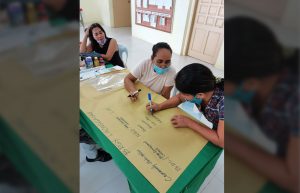
Though hounded by threats of Covid-19 pandemic, the Department of Social Welfare and Development (DSWD) Field Office Caraga remains optimistic to complete 274 community subprojects under the Kapit-Bisig Laban sa Kahirapan – Comprehensive and Integrated Delivery of Social Services (Kalahi-CIDSS) program in 2020.
A total of 202 subprojects are under the National Community-Driven Development Program (NCDDP) and 72 subprojects under the Payapa at Masaganang Pamayanan – Indigenous People Community-Driven Development (Pamana-IP CDD).
These projects, which are under Kalahi-CIDSS’s Disaster Response and Operation Procedure (DROP) modality, will be implemented in 152 barangays in 10 municipalities in Caraga Region.
The implementation of DROP is in response to Proclamation No. 929, which was issued last March 16, 2020, declaring a State of National Calamity for a period of six months for the entire country due to the pandemic.
DROP allows DSWD’s Kalahi-CIDSS-covered areas to shift its operations from regular developmental activities into a disaster response modality to immediately address issues related to early recovery.
Community projects proposed and funded range from Retrofitting/Refurbishing of dilapidated community infrastructures, Cash for Work projects, construction of Health facilities/amenities, procurement of Communication Devices for disaster operations, Construction of Communal Latrines, Construction of quarantine facility, Construction of hand wash area, Repair of water system, and fund Capability building activities relative to disaster.
Kalahi-CIDSS is one of the poverty alleviation programs of the government being implemented by DSWD. Employing community-driven development (CDD) as a strategy, Kalahi-CIDSS trains and engages communities together with their local governments (barangay and municipal) to choose, design, and implement development projects to address their most pressing needs.
Pamana on the other hand is a program under the Office of the Presidential Adviser on the Peace Process (OPAPP), is the government’s framework for peace and development. It is implemented in conflict-affected communities, as well as in areas covered by existing peace agreements.

